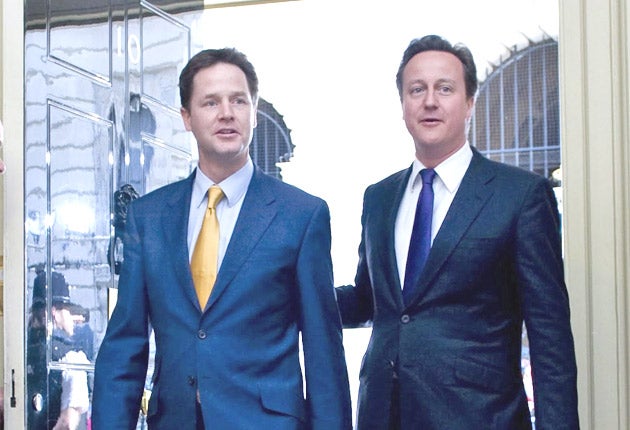Support for Lib Dems slumps as voters fear party has lost its way

Liberal Democrat support has slumped to its lowest level since the start of the general election campaign as voters protest that the party has lost its voice in the coalition government.
A ComRes poll for The Independent finds that backing for Nick Clegg's party has fallen to just 16 per cent, its worst showing since early April. It also found that almost three-quarters of the public says it does not know what the Liberal Democrats stand for any longer.
The survey puts the Conservatives on 39 per cent, down one point since the last ComRes survey for The Independent on 28 June.
Labour support is up two points to 33 per cent, while the Liberal Democrats are down two points – and well below the 22 per cent they achieved in the general election three months ago.
The continuing slide in the polls of the Liberal Democrats will intensify the pressure on Nick Clegg, who negotiated a power-sharing deal with David Cameron that flew in the face of the instincts of many of his foot soldiers.
Their alarm will be intensified by the finding that public sentiment is turning against the coalition in general and the Liberal Democrats in particular. A total of 73 per cent of voters agreed with the statement that it was difficult to know what the Liberal Democrats stood for now that they had joined the coalition, an increase of eight points since a ComRes poll on 2 June.
The public mood has also shifted against the Lib-Con agreement. Only 36 per cent agree that Britain is "better off with a coalition government than it would have been if either the Conservatives or Labour had won the election outright", with 50 per cent disagreeing. Two months ago, the public approved the creation of the coalition by a margin of 45 per cent to 43 per cent.
Mr Clegg, who is due to return from holiday next week, faces the task of steadying the party's nerve in the face of grim poll ratings.
Worries are growing among many Liberal Democrat MPs over the scale of the financial squeeze planned by George Osborne, the Chancellor, and fear they will pay a heavy political price in next year's local elections.
Some fear the party is acting as a fig leaf for ideologically driven spending cuts by the Tories. Plans to cut housing benefit, increase VAT rates, set up academies and "free schools", reorganise the national health service and end lifetime tenure for council-house tenants have also caused dismay among Mr Clegg's backbenchers.
A motion criticising the coalition's schools policies will be debated at next month's party conference in Liverpool, along with another urging that "those with the broadest shoulders carry the greatest burden" during the downturn. Mr Clegg insists the party is already making its influence felt on the coalition's programme. In his foreword to the conference agenda, published yesterday, he says: "I am proud that we have managed to put Liberal Democrat principles and ideas at the heart of government decision-making at this challenging time."
ComRes found that more than one third of people who supported the Liberal Democrats at the election have abandoned the party. It has held on to 63 per cent of its voters, compared with the 92 per cent of Labour voters and 94 per cent of Conservatives who have remained loyal. The proportion of 18- to 24-year-olds supporting the Liberal Democrats has dropped in each polls since the election and now stands at 26 per cent.
This fall is alarming for the party as surging support among young adults during the election campaign accounted for much of its rise.
Nearly three-quarters of voters (72 per cent) said vulnerable people would inevitably be put at risk by the planned public-sector spending cuts, with 23 per cent disagreeing. But 76 per cent acknowledge the cuts are "necessary in order to bring down the level of government debt".
Lib Dem views: 'It's difficult to see where we have an influence'
Sandra Gidley
Lib Dem MP 2000-2010
"My big, big concern is that people really do see this as a Conservative government and, apart from a couple of exceptions, it's difficult to see where the Liberal Democrats have had an influence. I would like to see the party be more bullish about being sure some of the Liberal Democrat priorities are put on the agenda."
Lembit Opik
Lib Dem MP 1997-2010
"My advice to Nick Clegg is: 'Don't panic' and 'Keep the faith'. The Liberal Democrats are used to fighting harder than the other parties for their share of the vote. Nick Clegg and co will be judged by what they achieve in the next four years. Actions speak louder than polls."
Bob Russell
Lib Dem MP for Colchester
"We need to hang on in there. These are early days into a five-year parliament. But clearly the party leadership needs to ensure that its backbench MPs, and the party more widely, are kept fully involved."
Mark Pack
Co-editor, LibDemVoice.org
"Politics isn't about winning elections, it's about implementing policy – and Liberal Democrat ministers are getting to do that day in, day out regardless of what that week's opinion polls say. Winning elections certainly also helps in politics, but with the next general election years away, national voting intention questions don't mean very much this far out."
Join our commenting forum
Join thought-provoking conversations, follow other Independent readers and see their replies
Comments